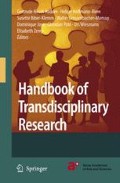Abstract
Transdisciplinary orientations in research, education and institutions try to overcome the mismatch between knowledge production in academia, and knowledge requests for solving societal problems. Addressing societal knowledge demands by designing research processes in a transdisciplinary way has several major implications. It becomes necessary to transgress boundaries between different academic cultures, such as between the humanities and the natural sciences. Furthermore, researchers have to step into problem fields and engage in mutual learning with people in the life-world. In doing so, disciplinary standards of knowledge production are sacrificed. Therefore, it is necessary to develop a state of the art for transdisciplinary forms of research. This is best done by learning from experiences. The Handbook is intended to enable learning from exemplary experiences in research and to provide a more systematic account of some cross-cutting issues. This chapter describes the idea behind the Handbook and the contents of the Handbook.
Access this chapter
Tax calculation will be finalised at checkout
Purchases are for personal use only
Preview
Unable to display preview. Download preview PDF.
References
Bammer, G.: 2005, ‘Integration and Implementation Sciences: Building a New Specialization’, Ecol Soc 10, 6, Retrieved, 6 December 2006 from http://www.ecologyandsociety.org/vol10/iss2/art6/.
Brewer, G.D.: 1999, ‘The Challenges Of Interdisciplinarity’, Pol Sci 32, 327–337.
Campbell, D.T.: 1969, ‘Ethnocentrism of Disciplines and the Fish-scale Model of Omniscience’. In: Sherif, M. and Sherif, C.W. (eds), Interdisciplinary Relationships in the Social Sciences, Aldine, Chicago, pp. 328–348.
Cetto, A.M. (ed.): 2000, World Conference on Science, Science for the Twenty-first Century: A New Commitment, UNESCO, Paris, 544pp.
Klein, J.T., Grossenbacher-Mansuy, W., Häberli, R., Bill, A., Scholz, R.W., and Welti, M.: 2001, Transdisciplinarity: Joint Problem Solving among Science. An Effective Way for Managing Complexity, Birkhäuser Verlag, Basel, 332pp.
Lubchenco, J.: 1998, ‘Entering the Century of the Environment: A New Social Contract for Science’, Science 279, 491–497.
Pohl, C. and Hirsch Hadorn, G.: 2007, Principles for Designing Transdisciplinary Research, Proposed by the Swiss Academies of Arts and Sciences, oekom, München, 124pp.
ProClim: 1997, Research on Sustainability and Global Change – Visions in Science Policy by Swiss Researchers, CASS/SANW, Bern, Retrieved 3 December 2006 from http://www.proclim.ch/Reports/Visions97/Visions_E.html.
Rosenblum, D.: 1997, ‘In the Absence of a Paradigm: The Construcion of Interdisciplinary Research’, Issues in Integrative Stud 15, 113–123.
Author information
Authors and Affiliations
Editor information
Editors and Affiliations
Rights and permissions
Copyright information
© 2008 Springer Science + Business Media B.V.
About this chapter
Cite this chapter
Hoffmann-Riem, H. et al. (2008). Idea of the Handbook. In: Hadorn, G.H., et al. Handbook of Transdisciplinary Research. Springer, Dordrecht. https://doi.org/10.1007/978-1-4020-6699-3_1
Download citation
DOI: https://doi.org/10.1007/978-1-4020-6699-3_1
Publisher Name: Springer, Dordrecht
Print ISBN: 978-1-4020-6698-6
Online ISBN: 978-1-4020-6699-3
eBook Packages: Earth and Environmental ScienceEarth and Environmental Science (R0)

